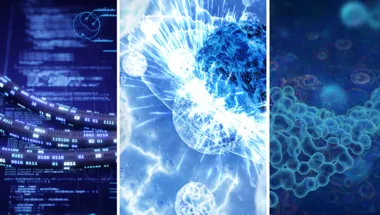
Biography
Profile
I graduated with an MSci in ‘Physics with Theoretical Physics’ from King’s College London in 2018. My final year project, titled ‘New computational approaches to dynamical correlation functions’ investigated a novel cavity graph representation as well as quantum Monte Carlo techniques for computing the spectral density of quantum many bodied systems.
The CANES masters programme has allowed me to build up a portfolio of techniques from a wide range of scientific disciplines which will aid me during and beyond my PhD.
My PhD project aims to investigate a compressed representation for a classical neural network through a tensor network description in order to map onto a quantum circuit. This would allow an exponential speed up in training in addition to increased complexity of input data.
Currently I am working on a modification of post-selection which is used within quantum computing to implement a desired transformation onto an input state. Our modification replaces the need to measure with new ancillae qubits whilst exponentially increasing the accuracy between the input state and desired state. Additionally this can be physically represented as a 'Quantum Maxwell's Demon' or by the eigenstate thermalisation hypothesis where the insertions of new ancillae qubits are considered to be interactions between the input state and a low-temperature heat bath.
PhD Project:
Research

Cross-Disciplinary Approaches to Non-Equilibrium Systems (CANES)
The mission of CANES is to train future research leaders in the understanding, control and design of systems far from equilibrium, based on rigorous training in theoretical modelling, simulation and data-driven analysis, and a breadth of awareness of common themes across disciplines.
Research

Cross-Disciplinary Approaches to Non-Equilibrium Systems (CANES)
The mission of CANES is to train future research leaders in the understanding, control and design of systems far from equilibrium, based on rigorous training in theoretical modelling, simulation and data-driven analysis, and a breadth of awareness of common themes across disciplines.
